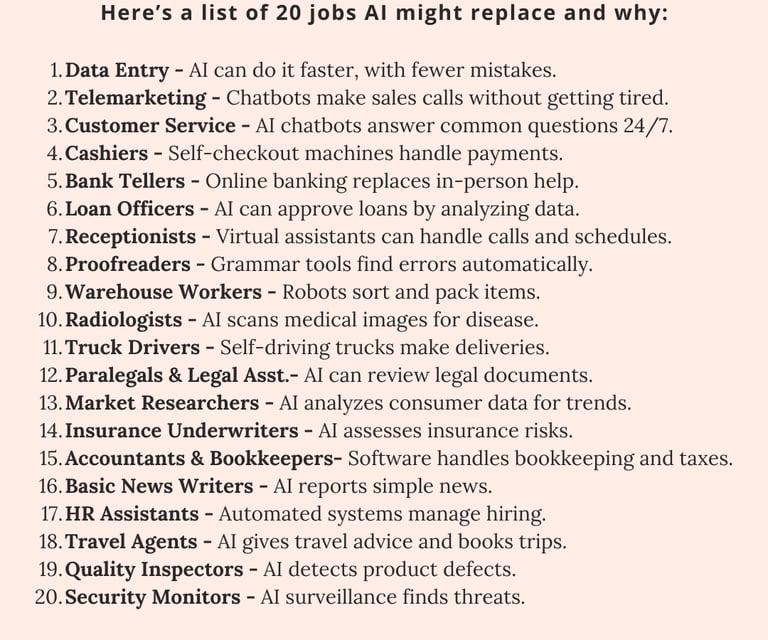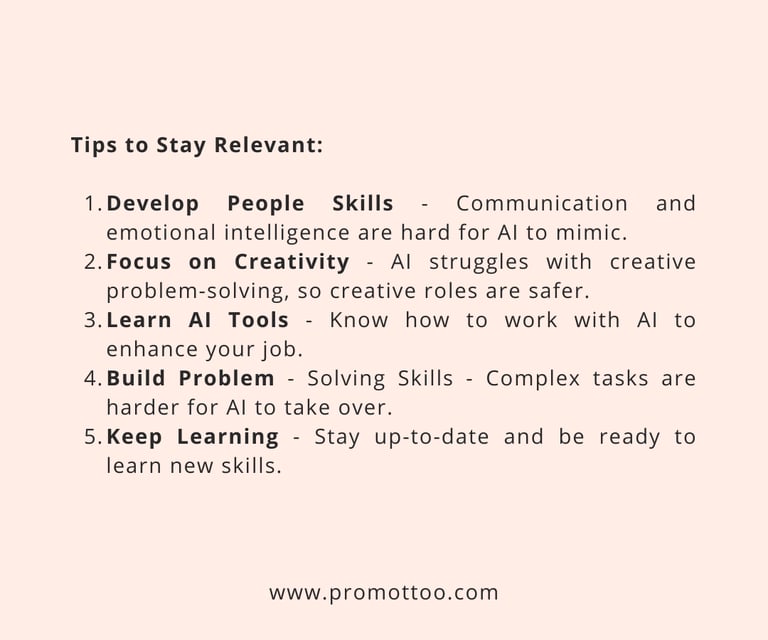
WILL AI REPLACE YOUR JOB? 20 ROLES THAT MAY DISAPPEAR
Did you know that jobs with simple, repetitive tasks are at a higher risk of being replaced by AI in the future?
AI is transforming the way we work, and it's natural to wonder if our jobs might be at risk. As technology advances, certain roles that rely heavily on routine tasks are increasingly handled by AI, which can perform them faster and often with greater accuracy. While some jobs are safe due to the unique human skills they require, others may change dramatically or even disappear as AI takes on more of these responsibilities. Here are 20 jobs that AI may replace in the future, with reasons why:
1. Data Entry Clerks
Why: AI can quickly and accurately process data entry tasks, reducing human error and speeding up data processing.
2. Telemarketers
Why: AI chatbots and voice recognition systems can handle outbound calls, sales inquiries, and customer queries with personalization, 24/7 availability, and without fatigue.
3. Customer Service Representatives
Why: AI-powered chatbots and virtual assistants can handle common customer inquiries, solving issues faster and providing consistent support around the clock.
4. Retail Cashiers
Why: Self-checkout machines and AI-enabled checkout systems reduce the need for cashiers by automating the payment process.
5. Bank Tellers
Why: AI in banking automates transactions, queries, and some advisory services, reducing the need for in-person interactions for standard services.
6. Loan Officers
Why: AI algorithms can analyze credit risk by examining customer financial histories, replacing loan officers in assessing and approving applications.
7. Receptionists
Why: AI-powered virtual receptionists can schedule appointments, answer basic inquiries, and route calls effectively, reducing the need for a human receptionist.
8. Proofreaders and Copy Editors
Why: AI-powered grammar and style-checking tools are getting increasingly sophisticated, capable of spotting errors and suggesting improvements, replacing the need for manual proofreading.
9. Warehouse and Factory Workers
Why: Robotics and AI can handle packing, sorting, and transporting materials in warehouses and factories, enhancing productivity without the need for human labor.
10. Radiologists and Medical Imaging Technicians
Why: AI can analyze medical images for signs of diseases like cancer more quickly and accurately than humans, reducing the need for human interpretation in standard cases.
11. Truck and Delivery Drivers
Why: Autonomous vehicles and drones are making it possible for AI to take over delivery and transport, reducing the need for human drivers.
12. Paralegals and Legal Assistants
Why: AI can review and summarize legal documents, assist in research, and even generate drafts for common contracts, reducing the need for support staff in law firms.
13. Market Research Analysts
Why: AI tools can gather, analyze, and interpret vast amounts of consumer data to predict trends and insights, reducing the need for human analysis in routine cases.
14. Insurance Underwriters
Why: AI algorithms can assess risk by analyzing customer data, allowing insurers to make quick and accurate underwriting decisions.
15. Accountants and Bookkeepers
Why: AI-powered software can handle bookkeeping, financial reports, and tax preparation, reducing the need for human involvement in standard accounting tasks.
16. News Reporters for Standard News
Why: AI can rapidly generate standard news reports, such as sports scores or financial updates, leaving human journalists to focus on in-depth reporting and investigations.
17. Human Resource Assistants
Why: AI can assist in hiring, onboarding, and training through automated workflows, reducing the need for manual support for administrative HR tasks.
18. Tour Guides and Travel Agents
Why: Virtual assistants and AI apps can provide personalized travel advice, booking services, and information on attractions, replacing some roles in tourism.
19. Quality Control Inspectors
Why: Machine vision technology allows AI systems to inspect products for defects more accurately and consistently than human inspectors.
20. Security Guards (for Monitoring)
Why: AI and machine learning in surveillance systems can detect threats, unusual behavior, or security breaches, reducing the need for live security monitoring in certain environments.
These roles are not expected to disappear entirely but may become more specialized, requiring skills in AI oversight, troubleshooting, or performing non-routine tasks that AI cannot handle well. Jobs with a strong need for creativity, emotional intelligence, and complex decision-making will likely continue to require human involvement. Overall, roles involving routine, predictable tasks are most at risk.
Tips to Stay Relevant:
1. Develop Soft Skills - Skills like emotional intelligence, communication, and adaptability are harder for AI to replicate.
2. Focus on Creativity - AI is less effective at creative problem-solving and innovation; creative roles in design, strategy, and arts are more secure.
3. Embrace Tech Skills - Learn to work with AI tools in your field, enhancing your role rather than competing with AI.
4. Build Problem-Solving Abilities - Complex, non-routine tasks are less likely to be replaced, so developing critical thinking skills is key.
5. Pursue Lifelong Learning - Stay updated with industry trends and be ready to reskill as technology evolves.
These tips can help future-proof your career in an AI-driven world.




